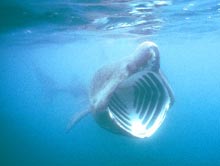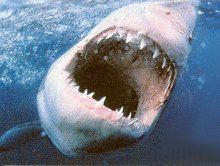Great White Shark
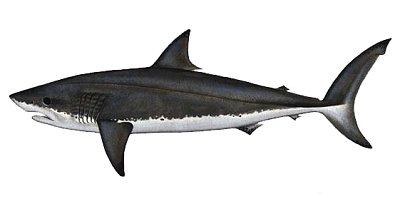
Carcharodon carcharias
Size:
to 26 ft, but more likely 12-16 ft
Habitat:
open ocean
Notes:
incredibly dangerous

Great Whites are not terribly fond of cold water and are more likely to be found further south, although they do appear regularly in Long Island Sound. They are typically pelagic but have been known to come close inshore and even into creeks and rivers on rare occasions.
The largest reported local sighting of a White Shark that I can recall was a 14 footer in Long Island Sound many years ago, and I doubt that they get any bigger than that around here. Any really large shark sighted in the bight is more likely a Basking Shark. The NJ state fishing record for a White Shark is 759 lbs - smaller than the record Mako. The record New York White Shark is 3450 lbs ( 1986, out of Montauk. ) Great White sharks are now strictly protected by law.
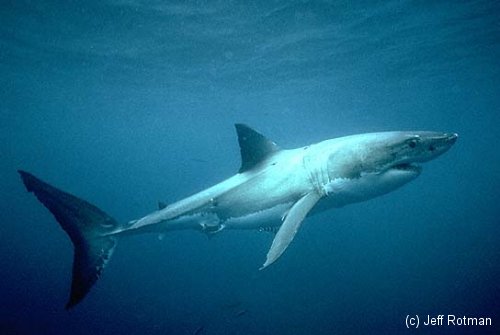
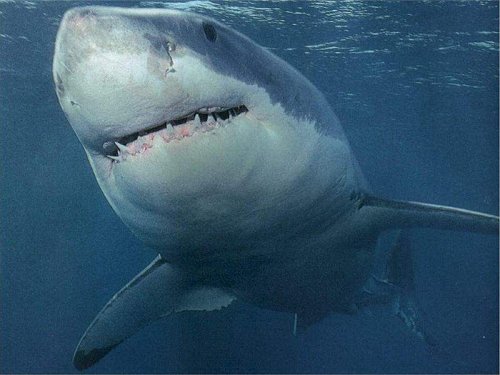
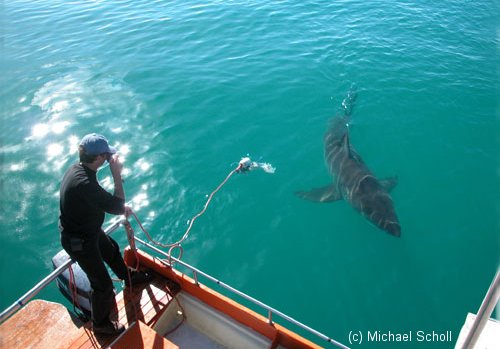
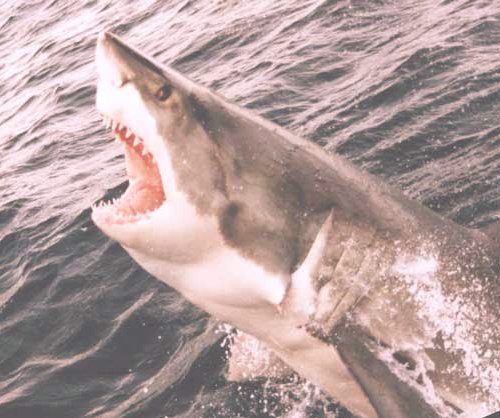
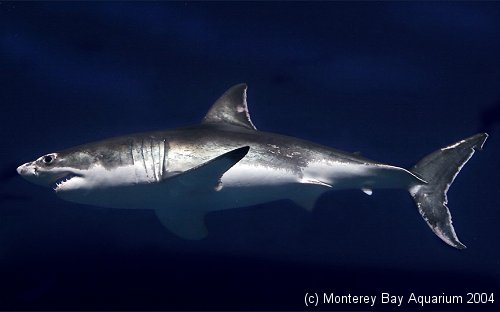
It seems to be pretty effective
"Jaws" Author Says Sharks Victims, Not Villains
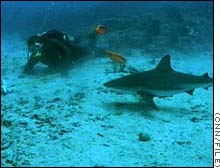
Despite their popular image as monsters, sharks are actually in greater danger from humans, according to author Peter Benchley
July 19, 2000
HONG KONG (Reuters) -- Author Peter Benchley, who instilled terror in millions of moviegoers and branded sharks the demons of the deep, is now exhorting the world to take action to protect sharks, calling them more victim than villain.
Benchley, author of the best-selling novel "Jaws, " and a co-writer of its top-grossing screenplay, made his appeal for measures to protect sharks on Wednesday in Hong Kong, the world's largest importer of shark fins.
"In the 25 years since 'Jaws' was first released, sharks have experienced an unprecedented and uncontrolled attack, " Benchley told a news conference. "Sharks are much more the victims than the villains, " he said. Benchley appealed for a cut in consumption of shark fin which he said was uneconomical and driving sharks to the brink of extinction.
"Asia is the largest consumer of sharks and shark products, " he said. "People should try to eat less shark fin soup and try to get a national ban on shark finning." Shark fin soup is a delicacy in Asia, the top consumer of shark fins and shark fin products. "The increase has been so enormous in the past few years that some species of sharks have been reduced by 80 to 90 percent. If this keeps up at the current pace, sharks will be wiped out, " he said.
Benchley said finning sharks or "ripping their fins off and throwing them back in the water to die" is uneconomical because 99 percent of the animal is wasted. Last year 6,000 tons of shark fins passed through Hong Kong for local consumption and export, equivalent to 20 million sharks, he said. "If you wipe out the sharks, there will be no more shark fin soup, " he said.

25 years after the release of "Jaws", researchers know Great White Sharks are less aggressive than they are depicted in the movie.
Benchley said that since "Jaws" was first turned loose on movie audiences a quarter of a century ago, sharks had been subjected to unrelenting assault by commercial fishermen. He attributed his own change of heart about sharks to the dramatic increase in the numbers of the animal being killed and to the increase in general understanding about them.
He said a hundred million of sharks were killed each year and only 12 people around the world were killed by sharks. "The chances of being killed by a shark are minimal to say the least," he said. "You are much more likely to be killed by bees, dogs, bats, and certainly in Hong Kong, automobiles." Benchley urged governments to protect sharks, saying the animal faced overfishing and had a slow reproduction rate.
Although acknowledging that the concepts upon which "Jaws" was based were mostly erroneous, he said that was the extent of knowledge at the time. "Back then it was thought and accepted by everybody that great white sharks targeted human beings."
"Now we know that Great White sharks, and indeed all sharks, avoid people, and 70 or 80 percent of the time if they bite a human being it's by accident and they spit the human being out." Despite his transformation from demonizer to protector, he noted: "I don't regret writing "Jaws." the information that was there at the time was as good as it was."


